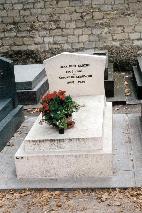Sartre, Jean-Paul |
| WRITER, PHILOSOPHER, LITERARY CRITIC (FRANCE) |
|
BORN 21 Jun 1905, Paris - DIED 19 Apr 1980, Paris BIRTH NAME Sartre, Jean-Paul Charles Aymard CAUSE OF DEATH oedema of the lung GRAVE LOCATION Paris: Cimetière du Montparnasse, 3 Boulevard Edgar Quinet (division 20 (ashes)) |
|
Jean-Paul Sartre was the son of a Navy officer. His mother was a cousin of Albert Schweitzer. His father died when he was one year old and his mother raised him in Paris with the help of her father, a professor of German who brought him into contact with classical literature. He studied philosophy in Paris. At the École Normale he met Simone de Beauvoir in 1929, who became his lifelong companion, although they would have other lovers. From 1929 to 1931 he served in the army. In 1939 he entered the French army and in 1940 he was captured and imprisoned by the Germans. In 1941 he was released, and he became a teacher in Paris. He was involved in the Socialisme et liberté group but he was unable to convince Gide and Malraux of joining them. He befriended Camus and he contributed to the latter's newspaper Combat. After the war he started Les Temps Modernes, a monthly literary and political magazine. He wrote several novels in which he recalled his war experiences. In his work Sartre developed Heidegger's existentialism into an influencial philisophy of freedom of the autonomous individual. He denied the existence of God. He became a communist and from 1962 to 1967 he had an affair with his beautiful Russian interpreter Lena Zonina, who probably was a KGB agent. She translated some of his work in Russia and he visited her eleven times in the Soviet Union. Simone de Beauvoir knew about the affair but treated her friendly. Sartre was opposed to French rule in Algeria and he adopted his Algerian mistress Arlette Elkaïm in 1965. Sartre tried to combine his existentialist ideas with communist ideas. He met Fidel Castro en had discussions with Che Guevara, whom he admired. In 1964 he refused the Nobel Prize like he had refused a Légion d'honneur in 1945. It seems that in later years he wanted the money after all, but his request was denied. During the student revolution in 1968 he was arrested, but Charles de Gaulle pardoned him immediately, stating that "Voltaire shouldn't be arrested'. In 1974 he visited Andreas Baader of the Red Army Faction in prison. His biography of Gustave Flaubert was unfinished when he died in Paris in 1980. Related persons • was the lover of Beauvoir, Simone de • was opponent of Breton, André • supported Brodsky, Joseph |
| Images |
Sources • Moerman, Josien (ed.), Lexicon Internationale Auteurs, Het Spectrum, Utrecht, 1985 • Schriftsteller Lexikon, VEB Bibiographisches Institut Leipzig, Leipig, 1990 • Jean-Paul Sartre - Wikipedia (EN) |



